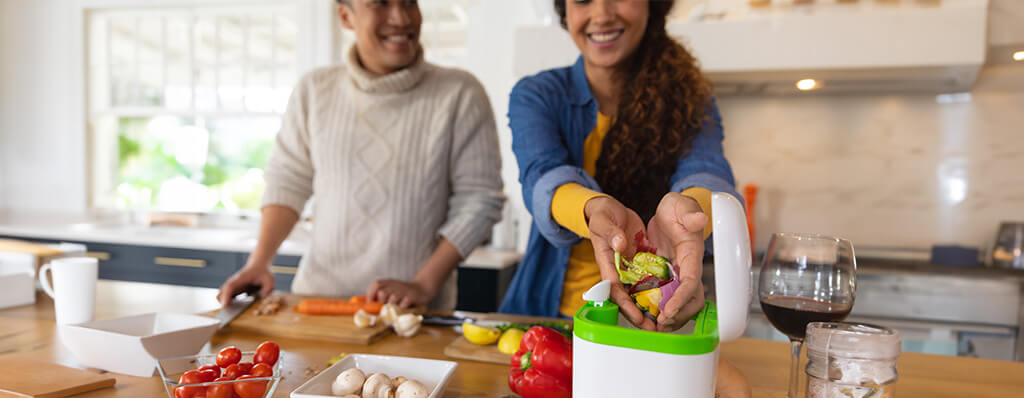
Reducing Food Waste: How to Make a Difference
Reducing Food Waste: How to Make a Difference
When we shop for groceries or grab a meal at a restaurant, we don’t always think about what happens to the food we don’t eat. In the U.S., about one-third of the food that’s meant for people ends up in the trash. This waste isn’t just about throwing away meals—it’s also the biggest type of waste in our landfills. This creates financial losses and wastes resources like time, energy, and water. Even more concerning, food waste adds to global warming, one of the world’s most pressing problems.¹
How Does Food Waste Contribute to Global Warming?
Food production leaves behind a lot of carbon emissions, which are harmful gases that contribute to climate change. When food goes to waste, all the energy and resources used to produce, transport, and store that food are also wasted. Worse yet, when food rots in landfills, it produces methane, a greenhouse gas that’s even more powerful than carbon dioxide. Methane can cause up to 28 times more warming over a century, and 84 times more over a shorter 20-year span.² Reducing food waste can significantly help reduce these harmful emissions.
What Can You Do?
Fortunately, there are simple ways we can reduce food waste at home. By making a few small changes, we can protect our environment and save money at the same time. Here are some easy steps you can take:
- Plan Meals and Make a Shopping List: Planning meals for the week and sticking to a grocery list helps avoid buying more food than you need.
- Store Food Correctly: Keep your refrigerator at 40°F (4°C) or lower to slow down spoilage.³ Use containers that keep air out, and separate fruits like apples and bananas from other produce to prevent faster ripening.
- Use Leftovers Creatively: Instead of throwing away leftovers, repurpose them. For example, extra vegetables can be used in soups or stir-fries, and overripe fruits can be blended into smoothies.
- Compost Food Scraps: Instead of tossing food scraps in the trash, consider composting them. Composting turns food waste into nutrient-rich soil that’s great for gardens.⁴
Composting in Longmont: Easy, Affordable, and Eco-friendly
In Longmont, it’s easier than ever to compost. The city offers curbside compost collection, making it affordable and eco-friendly for residents to reduce their food waste. Simply place your food scraps, like fruit peels, eggshells, and coffee grounds, in the provided bin, and they’ll be picked up and turned into compost. You can check out the city’s website for more information on how to get started with curbside composting.⁵
Donate Excess Food Locally
If you have extra food that you won’t be able to eat, consider donating it to help those in need. In Longmont, there are local organizations like the Longmont Food Rescue, local shelters, and community centers that welcome donations. Fresh Food Connect is another tool that connects gardeners with local food banks. However, if you’re not a gardener, donating extra non-perishable items to local food pantries is a great way to help reduce food waste and support those in need.
Additional Ways to Reduce Food Waste
There are other small changes you can make that can help lower your food waste:
- Freeze Extra Food: Freezing food is a great way to save items you can’t use right away. Bread, fruits, vegetables, and even pre-cooked meals can be frozen for later use.
- Understand Expiration Dates: Not all food needs to be thrown away right when it reaches its expiration date. “Sell by” dates are for stores, and “best by” dates tell you when the food is at its peak quality, not when it becomes unsafe to eat. Trust your senses before throwing food away.⁶
- Use “Ugly” Produce: Don’t judge food by its appearance! Misshapen or slightly blemished fruits and vegetables are still perfectly fine to eat. You can use them in smoothies, soups, or sauces.
The Benefits of Reducing Food Waste
By cutting down on food waste, you can help save money and protect the environment. Less waste means fewer resources used for growing, transporting, and storing food. Plus, it helps reduce greenhouse gases that contribute to climate change. Reducing food waste also plays a crucial role in fighting food insecurity by helping those in need. In fact, many people in our community could benefit from the food we might otherwise throw away.
Small Changes, Big Impact
Every small step we take to reduce food waste can make a big difference. Whether it’s planning your meals, composting food scraps, or donating extra food, these actions add up. Together, we can help fight climate change, save precious resources, and ensure a better future for our planet.
Let’s make reducing food waste a part of our daily lives—because when we waste less, we all benefit.
Footnotes:
¹ U.S. Environmental Protection Agency (EPA) – From Farm to Kitchen: The Environmental Impacts of U.S. Food Waste
² European Commission – Methane Emissions and Their Impact
³ USDA – Food Safety and Inspection Service: Cold Food Storage Chart
⁴ USDA – Composting at Home: A Guide to Reducing Food Waste
⁵ City of Longmont – Sustainability and Composting Services
⁶ USDA – Understanding Food Product Dating
